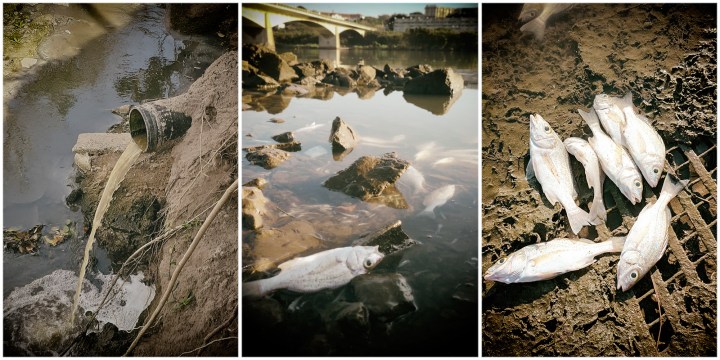POISONED WATERS
Government dithers over court or ‘stern talks’ to resolve Durban’s sewage pollution crisis

A torrent of raw sewage and bacteria from the backsides of well over a million Durban residents is still flowing untreated into local rivers and the sea in the wake of the devastating April/May floods.
Senior government officials have confirmed that five months down the line, more than 50% of daily sewage flows in a city of well over three million people remain untreated – along with undisclosed volumes of industrial effluent. This has stained the ocean a muddy brown, raising the risk of water-borne disease for ocean users and is slowly poisoning the city’s river and marine food resources.
One of the most damaging impacts has been the repeated closure of several tourist beaches due to high readings of sewage indicator bacteria in the surf. Over the weekend (17 Sept), Durban was forced to shut down several more beaches indefinitely.
But there are other hidden costs as the flow of human poo continues to accumulate in river estuaries, wetlands and along the shoreline.
At a visible level, there have been at least two major fish kills in the Umgeni and Isipingo rivers over the last few weeks that are thought to be linked to a rapid drop in water dissolved oxygen levels. But there could be longer-lasting impacts on the rich and complex sea food chain.
Estuarine expert Nicolette Forbes of the Marine & Estuarine Research consulting group explains that the volume of dissolved oxygen drops sharply in river and estuary water when massive volumes of nutrient-rich organic matter (sewage) start to decay.
Water oxygen levels plummet as bacteria feed on the decaying nutrients. This remains the status quo as the breakdown of organic matter (sewage) continues. As long as there is sewage flowing to the estuaries and coast there will be breakdown and a loss of oxygen in the water.
A secondary effect is the release of nutrients from this decay which results in cyclical algal blooms. The proliferation of algae will cause oxygen levels to rise sharply during the day as algae harvest the energy of the sun into chemical energy via photosynthesis.
Sea life killed by ‘flip-flopping’ oxygen levels
The dissolved oxygen will then plummet during the night and early hours of the morning. She said this state of regular and extreme “flip-flopping” of oxygen levels not only kills fish, but can also knock out other organisms in the food chain such as crabs, prawns and important estuary creatures.
“Since the flood we have had sustained chronic conditions persisting in the estuaries of excess organic matter and low dissolved oxygen levels which damage the vital fish nursery function of estuaries by disrupting life cycles and possibly wiping out generations of young fish and prawns that would have swum back to repopulate the sea if they had survived.”
Visit Daily Maverick’s home page for more news, analysis and investigations
Mussels and oysters health risk
Forbes said she was also concerned about the potential health risk to people harvesting filter-feeders such as mussels and oysters, which can bioaccumulate disease-causing pathogens from sewage and poisonous heavy metals from industrial effluent.
While estuaries would very likely recover over the long term, once effluent flows reduced, the short and medium-term impacts on local food chains were less clear because of the “unprecedented” nutrient flows.
The eThekwini municipality has argued that it is hamstrung financially as it grapples to access disaster relief funds or reprioritise existing budgets to restore drinking water to several areas; to repair critical infrastructure and also meet the immediate social needs of those displaced by the floods.
Nevertheless, the national custodian of the country’s fresh water resources has now voiced concern over the slow pace of repairing Durban’s battered wastewater treatment facilities.

Effluent pours from a broken sewer line in Riverhorse Valley in Durban on 12 May. This pipeline has now been repaired. (Photo: Supplied)
In normal times, sewage and industrial effluent in the northern parts of the city is collected through a vast network of pipelines for filtering and decontamination at several treatment plants. It is then released back into rivers and the sea after being semi-purified. In other parts of the city, the normal treatment process is more rudimentary, as large volumes of effluent are pumped directly into the sea via two sea outfall pipes at distances of between three and four km offshore.
But most of this treatment has been largely absent since April – and in some cases, well before the floods – due to major damage to conveyance pipes, treatment plants and pump stations across the city.
At an informal media “networking session” in Durban on 16 September, senior officials of the Department of Water and Sanitation confirmed that more than half the city’s wastewater flows are still running directly into local rivers, and then into the sea.
R651m infrastructure repair bill
Ashley Starkey, provincial head of the national Department of Water and Sanitation, said the repair bill had been estimated at around R651-million.
Angela Masefield, the department’s regional director (regulation) said eThekwini’s repair programme had focused mainly on restoring tap water to local residents but “the sewage side has been slower”.
She noted that more than 100 sewage pumping stations had been damaged during the floods and repair work by the municipality had achieved about 50% progress.
She said the Northern Waste Water Treatment Works, which pretreats sewage flowing into the Umgeni River, was not operational, noting that: “Progress is not fast enough and we have requested action plans from eThekwini.”
Siyabonga Buthelezi, an aquatic scientist and water quality manager, said his department had decided to “take some steps” to compel eThekwini to resolve the treatment failures more rapidly.
Buthelezi was reluctant to disclose the exact nature of these steps, but confirmed that his department had already served a formal directive (administrative warning) on the city.
Pressed on whether the department was considering a criminal prosecution of the city in terms of the National Water Act, Buthelezi said: “It is a process. We have suggested something to our legal section, or it could involve the Minister (Senzo Mchunu) talking directly to the Municipal Manager or the Premier.
“But yes, five months down the line, not much has been done. Hence we have made a recommendation to our legal guys … The (aquatic) system can only take so much (prolonged sewage input) and in some cases there may be other chemicals.”
Legal action not ruled out
Sputnik Ratau, spokesperson for the national water and sanitation department, said the three tiers of government were committed to the principles of cooperative governance, but the possibility of legal action could not be ruled out.
During a hearing of the SA Human Rights Commission in Durban last month, senior city officials said the municipality needed to spend more than R20-billion within the next 10 years to ensure that its water and wastewater systems could support an increasing population – but there was no money to do this, they said.
Last week the city also issued a statement that it was “hard at work to ensure that flood damage to infrastructure is repaired as speedily as possible”.
“The City would like to assure members of the public that the 13 beaches that were opened over the weekend remain open. They will remain open until results from eThekwini’s accredited laboratory indicate that a different decision needs to be taken.
Tourist beaches closed
But on September 17 it announced further closures with immediate effect after the latest round of testing – including most of its popular central beaches.
“The following beaches are closed: Brighton, Ansteys, Point, Ushaka, Addington, South, Wedge, North, Bay of Plenty, Battery, Country Club, Thekwini, Laguna, Baggies and Reunion beaches.”
Umhlanga main beach, Umdloti, Westbrooke and Bronze beaches also remain closed.
“Beaches that remain open include Toti, Pipeline, Warner, Winklespruit and Umgababa beaches.”
In a previous statement the city said it would increase the frequency of testing at bathing beaches and pledged to “publicly share these results as expected”.
Curiously, however, the city is stalling on our request for copies of laboratory-accredited results of recent beach water testing. Our Burning Planet has now lodged a formal application for these results in terms of the Promotion of Access to Information Act. DM/OBP




















 Become an Insider
Become an Insider
To make matters worse the rainy season is upon us again and little evidence of repairs to damages from the floods appears to have been carried out. Both to sewage systems and roads and drainage infrastructure. Hopefully we don’t see any major flooding again this year.
Ethekwini Council declares Winkelspruit beach open! Yet sewage continues to flow into the lagoon/ estuary and then into the bathing area and the sea stinks.
One must question eThekwini’s testing.
Please investigate this
The issue of sewage spill in Durban is not new nor is it as a result of the floods only. At its centre, is corruption, failure to maintain infrastructure, poor quality of construction through use of unqualified contractors to construct infrastructure for sanitation, lack of engineers in the municipality, criminality by thugs spawned by the ANC to hijack tenders in that city and province. The price the Province will pay will be less tourism as its beaches are not only a danger to marine life but tourists. The current ANC leadership seems to grasp the dangers but what surprises is the lack of action by the police and NPA on the criminality committed in daylight. We have a failing law and order despite the theatrics by the pick and pay general.
You have got it right – I see the main problem as the fact that the municipality does not have any “leaders” amongst its senior engineering staff, most of whom are not professionally registered engineers and as such are not competent to properly manage the necessary infrastructure.